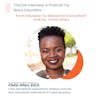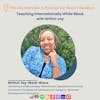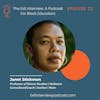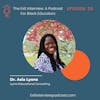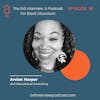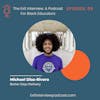
Episode 35: Teaching Internationally While Black with Brittni Black with Brittni Joy
After teaching in Atlanta's public schools, Brittni Joy had to make a choice, quit teaching or try her hand at teaching in the Middle East. Take a listen as she shares her experience as an educator both here and abroad, what she feels would improve schools in the United States and what she is up to now that she is back state side.
In this enlightening episode of 'The Exit Interview', Dr. Asia Lyons and Kevin Adams talk with Brittni Joy about her vast teaching experience both domestically and internationally. Brittni Joy embraces the paradoxes of her journey and as a black educator, she covers the unique challenges that have shaped her career. Brittni shares captivating stories about her different teaching stints in the US and abroad, impressing with her vast insights about the teaching field. She sheds light on the structural issues deep-rooted in the American educational system, contrasting it with how she felt as a black woman teaching overseas, who was seen first and foremost as an 'American' rather than being identified by her race. Brittany dives more profound into her journey describing how her philosophical outlook towards humanity and empathy has shaped her educational approach. She advocates for the importance of culturally responsive education and discusses the nuances of meeting the distinct needs of different students based on their nationality and culture. This episode spirals into various aspects of her life that have brought her joy and fulfillment while at the same time, illuminated the pathways of her career. Her entrepreneurial venture into a consulting firm is another exciting aspect of the conversation, where she works towards humanizing the corporate space. Whether you're an educator, a student, or even an interested individual, this episode will surely engage you with its stimulating discussions and thought-provoking inputs on education, culture, and the human aspect within these realms.

Welcome to Brittni Joy's exit interview! After teaching in Atlanta's public schools Brittni had to make a choice, quit teaching or try her hand at teaching in the Middle East. Take a listen as she shares her experience as an educator both here and abroad, what she feels would improve schools in the United States and what she is up to now that she is back stateside.
Want more scope on The Exit Interview and more? Sign-up for the Black Educators, Be Well newsletter!
First of all.... have you signed up for our newsletter, Black Educators, Be Well? Why wait?
Amidst all the conversations about recruiting Black educators, where are the discussions about retention? The Exit Interview podcast was created to elevate the stories of Black educators who have been pushed out of the classroom and central office while experiencing racism-related stress and racial battle fatigue.
The Exit Interview Podcast is for current and former Black educators. It is also for school districts, teachers' unions, families, and others interested in better understanding the challenges of retaining Black people in education.
Please enjoy the episode.
Peace out,
Dr. Asia Lyons and Kevin Adams
Teaching Internationally While Black with Brittni Joy
Brittni Joy: [00:00:00] Especially in our black community, elder black people struggle with being able to look at how great you can be and then propel you further into it. Because they are threatened by what might happen to them if you exempt. And I get it. The irony of me being able to teach humanness in my company that I do own is understanding the historical context, the reasons behind things, and the reason to connect the dots to show you the why.
In the past, you all wouldn't have been promoted in these high level positions because they only have space for one Black. They only have space for one smart Black. They only have space for one talented Black. They only, so cool, I did it. However, in the year of our Lord, 2002, I would venture to say that some of those things started to shift.
Dr. Asia Lyons: Welcome to The Exit Interview, a podcast for Black educators, where we, Dr. Asia and Kev, delve into the crucial but often overlooked conversations surrounding the [00:01:00] retention of Black educators. While the spotlight shines in recruiting efforts, we turn our focus to the stories of those who've left the field of teaching.
The exit interview aims to spark dialogue among school district administrators, school unions, families, educators, and anyone else passionate about fostering a more inclusive and supportive educational environment. Join us as we elevate these narratives, shedding light on the challenges faced by Black educators, and providing valuable insights for the future of education.
Welcome to The Exit Interview.
Brittni Joy: All right, everyone.
Dr. Asia Lyons: Welcome back to another episode of The Exit Interview, a podcast for Black
Brittni Joy: Educators with me, Dr. Asia Lyons, and one of my favorite people,
Dr. Asia Lyons: Kevin.
Kevin Adams: How's everybody doing? So glad to be here again with another Exit
Dr. Asia Lyons: Interview. It's good to see your [00:02:00] face, Kevin. Oh, yes. It's good to see you.
Thank you. I think this is the first time we've seen
Kevin Adams: each other in
Dr. Asia Lyons: 2024. I think it is. And so, Kevin
Brittni Joy: and I never see each other in real life. Like, once a
Dr. Asia Lyons: year, twice a year. And people are always surprised
Brittni Joy: by that. But like his, like physically seeing him, it's been a minute. Oh, wow. But, yeah. We had the Juneteenth hangout
Dr. Asia Lyons: at his house.
That was it. So. We have a guest today, Brittany, so Brittany is going to tell us all about herself, Brittany Joy. I'm going to
Brittni Joy: read her bio, we're going to talk a little bit about how we met, and then we're going to jump into these questions. So, first
Dr. Asia Lyons: thing, Brittany Joy is a woman who lives a life of purposeful integrity.
As a Denver native, she grew up in a neighborhood that promoted the nurturing of community, a belief in collaboration, and placed a large input in expression and creativity. She has used these skills to develop a platform that builds upon
Brittni Joy: the use of connectivity in business and beyond. Having lived abroad for almost a decade, which we're going to
Dr. Asia Lyons: talk about, [00:03:00] Brittany brings a very diverse cultural mentality
Brittni Joy: to her
Dr. Asia Lyons: workshops and speaking engagements.
Brittni Joy: She understands that culture, experience, knowledge, and empathy are the pathways to create a
Dr. Asia Lyons: more cohesive community. Brittany has experienced over 45 countries to date.
Brittni Joy: And no, but that's okay. 47. I just
Dr. Asia Lyons: told her all before
Brittni Joy: we started recording, girl, get your bio together. That's
Kevin Adams: right.
Brittni Joy: That's right. That's right.
Like my life is getting amazing. So that's right. I love that. 47
Dr. Asia Lyons: countries to date and knows that the largest connector globally is empathetic engagement. That's Brittany Joy has a BA from Spelman College who just received a major donation of a hundred
Brittni Joy: million dollars. A million dollars. Largest donation in HBCU history.
So excited. Located in Atlanta, Georgia. USA in Child Development and an MA [00:04:00] in Business Administration
Dr. Asia Lyons: from the University of Roehampton, London, UK. She also has a Hospitality Management Certification from Florida Atlantic University in Boca Raton, Florida, USA. Her educational achievements have led her to understand and explain a
Brittni Joy: wide variety of topics to be able to provide insight and consultation on
Dr. Asia Lyons: said topics.
Her strength is justice, equity, diversity, and inclusion, JEDI. Brittany Joy understands that with a focus on Jedi, the empathy is second nature in the organization. Empathetic engagement is a platform that is a component of every workshop and event that she conducts. Having the
Brittni Joy: courage to see others in conversation, community, and alliance provides growth in
Dr. Asia Lyons: self and others.
Providing these engaging opportunities is what Brittany Joy stands for.
Brittni Joy: Welcome, Brittany. Thank you. Of course. So Brittany and I met the Clayton, the Clayton is a club, like
Dr. Asia Lyons: a, what would, how would you describe it,
Brittni Joy: Brittany? [00:05:00] So we call it like a private members only social club. You bring people together, are more social and guests.
Dr. Asia Lyons: Yes, we met up there and she was doing her and my shout out to Tanoa. Tanoa introduced us and
Brittany
Brittni Joy: was just like the shining, right? She's laughing in the corner and having this good time.
Dr. Asia Lyons: And I'm like, I gotta
Brittni Joy: meet this woman. And so in our, one of
Dr. Asia Lyons: our conversations, she's like, yeah, you know, I was a teacher internationally, but
Brittni Joy: I would never teach in the United States because,
Dr. Asia Lyons: and I'm
Brittni Joy: like, hold that
Dr. Asia Lyons: thought.
Like, you gotta get on the
Brittni Joy: podcast.
Dr. Asia Lyons: So it's been a long time coming. She's going to tell us her story. About teaching internationally or ideas, but super
Brittni Joy: excited to have you on the show. Welcome Brittany. Thank you so much for having me. Yeah, of course. Listen, on education, it's a whole different platform.
But yeah, that is my life. When I graduated from Spelman, I was obviously a child development major. So that goes into education. It's more [00:06:00] psychology based, but I took my certificate to get certified as a teacher. Anyway, um, ironically, I became a teacher because I was bartending and lifeguarding the year after I graduated from college.
Within the same week, this is how I know it was probably like the Lord, right? Within the same week, I was teaching a private lesson to this little girl named Miracle. And Miracle doesn't talk to anybody but her mom and her grandpa. And Miracle and I were talking about her new Michael Vick jersey. This is gonna age me a little bit.
But, her new Michael Vick jersey. And I was like, okay, like, tell me more, kick, kick, kick. And her mom was on the phone and was like, Is she actually talking to you? And I was like, yeah. And she was like, what is she talking about? And I told her, her mom was like, oh my gosh, you should be a teacher. And I laughed and I said, well, I'm certified to teach.
And she said, what? And you teach a swim lesson. That Saturday, my mom called me and she said, so hey, real quick, Just so you know, I didn't pay 100, 000 for your education [00:07:00] for you to bartend and teach swim lessons. You could've stayed in Colorado to do that. So, I need you to get a real good shirt.
Dr. Asia Lyons: Wait, why your mom come for your baby hairs?
Brittni Joy: I mean, right here, honey. Okay, like And she said, I didn't
Dr. Asia Lyons: drop on private education because that's what it is. For you to bartend and get chlorine
Brittni Joy: in your hair. Okay. And so ironically, the woman who I was teaching swim lessons to her daughter, she was like, well, this weekend, DeKalb County is having a teacher's fair.
And I want you to come because I'm gonna hire you at my school,
Dr. Asia Lyons: period. Okay. There you go.
Brittni Joy: Told. I went to the teacher's fair. I got voluntold that I was coming the same week that my mom was like, you need to go get a real people job. And I got a real people job. I got offered three positions that day at that fair.
And I took the one at her school because obviously she was the one that brought me there. And the horrible truth was that she left the next year. Oh, no, she at this school was [00:08:00] her. She wasn't even there anymore. She got promoted to an educational specialist. But, okay, that was my connection to the school.
So I taught in Atlanta. I taught in DeKalb County for four years. And this was a very shady situation. It's actually the reason why I moved overseas. So my principal at the time, and you know, if you know me, You know who it was, but my principal at the time, my first two years when you start teaching in most districts, you're stuck at that school, right?
For those first two years. So cool. I was prepared for that. By my second year, I was like, oh, you know, I used to be a cheerleader and all these things. So I started cheerleading at my school because whatever, we didn't have nobody to cheer for, but we was cheering. And I was teaching gymnastics and dance and things still at the YMCA.
So when we were getting new mats, I was donating the mats to my elementary school so I could teach these kids gymnastics and do things I already know how to do. Well, my third year I was ready to leave the school, and when the transfer portal opened, my principal put me on a PDP, couldn't transfer. Tell our guests what a PDP is.
This is a [00:09:00] professional development plan. It means that you have to meet all of the criteria before you can be removed from this professional development plan, and you are not allowed to transfer to a different school when you are placed on a professional development plan.
Dr. Asia Lyons: In Georgia,
Kevin Adams: is there like, uh, three years and you meet that non probationary period?
Is that part of it? Like, that's how it is here.
Brittni Joy: Kind of. So, like, you have the two year period where, like, you have to be at this school. That third year is the year where once they open that transfer portal, you can go to any other school. However, she put me on the PDP literally three days before transfer portals opened and took me off two days after.
Needless to say Wait, wait, wait, wait,
Dr. Asia Lyons: wait. We gotta give us a chance to catch up. Because my box was open and folks can't see that if we're on
Brittni Joy: audio. Ugh. She put me on three days before the transfer portal opened and took me off two days after it closed. So I could not transfer from her school. And [00:10:00] I was like, I need a job.
So I didn't quit because like, I need to still teach, right? So that fourth year, okay, now I'm here, I've been here, we got cheerleading. Oh, now my girl's got something to cheer for because the coach has decided, well, maybe we should do some sports. Imagine. So now we got football and basketball for the kids.
My girl's just been cheering though. We was cheering at fake pep rallies and whatever the Lord said. Yeah, yeah. So now we're cheering at the games. My girls are learning to tumble. All of them are starting to do like full roundoffs and back tucks. I'm teaching them. I start student council that year. I'm definitely like, we're going to make these kids amazing because these little Black kids that look like me, we finna be amazing, right?
And then my principal was still on that nonsense. So that year, all these contracts came out. I got offered a contract and seven of us, the last day contracts were due, still hadn't turned in our contract. And I was the only one who was like, nah, I'm good, by the end of that day. You quit? There were seven of us that were like, Nah, hold up.
Kevin Adams: Do I
Brittni Joy: [00:11:00] want you? Right? So I was the only person that did not turn in my contract. However, one of my friends, ironically, Canceled the contract a few years later, but this moves into me moving overseas. So, I decided I wasn't going to continue teaching in the county. I went on credit. Wait, wait, wait. You just.
Okay, come on, come on, come on. So, she's not even taking a breath.
Dr. Asia Lyons: I'm trying to interject. Keep going. Really good.
Brittni Joy: Listen, I'm trying to give you all the tea so we can get there, okay?
Kevin Adams: She's chock full.
Dr. Asia Lyons: Careful. We got a salad in here with meat in it. And all the good stuff before we even get to the full meal, I just need to back up and I need to explain to us what do you think was the tension between you and the principal?
Like, what was that about?
Brittni Joy: Because
Dr. Asia Lyons: we haven't had that particular situation named in our podcast yet. That kind of move that she did. So we need to
Brittni Joy: understand what that, why that was a thing or why you think it was a thing at that school. So I'm cognizant that I made the school better. And I think that when you are [00:12:00] in spaces that you make better, people are fearful of you leaving there because they know that you're going to take whatever was better with you.
Yeah. So when I started that cheerleading squad, it was under the guise of, I already do this. So let me do this here. And it
Dr. Asia Lyons: would be
Kevin Adams: happening wherever you would be. We cheering.
Dr. Asia Lyons: That's part of
Brittni Joy: what you get when you get British. Right. That's right. Yeah. And for me, I mean, my first year, like, our cheerleading was like these little t shirts that I got printed and like, so wear your jeans, right?
But my second year, like, nah, we wearing flyaway skirts, okay? Uh oh. Could not own three way tumble down the road, like, cause this is who I think big all the time. Yes, yes. And I think that my principal enjoyed the bigness while being fearful of how great that was going to be. I was also young, so I know that me and her was like, she's a little older, and I was like, well, sis, you not gonna tell me.
Especially after my first year when my first graders had the highest reading scores. Like, you're not going to keep telling me what I'm not doing right. And my test scores are showing differently. Like, my students are showing me differently. And even for my cheerleaders, the [00:13:00] example was my second year I created a contract.
And that was for my kids and my parents. Let me tell you what you not going to do is embarrass Ms. Ware. So with that in mind, we don't do C pluses or lower. So you're going to have to have a plus. I'm the first person that looks at your report card before your parent sees it. You're I get to talk to your teachers about your behavior.
Please note that the whole squad suffers when you suffer, so we're not suffering together. I need you to get it together. And on top of that, you do not get to cheer with, cheer for me or with me if these things happen. You sign it, your mama signs it, so everybody on the same accord. Can't nobody come back and be like, Why you suspend her?
Cause she got a seat. And you knew that when we started that we don't do that. So. My principals saw the effort that the parents love on me. Oh my God, miss, we're all the things, right? I think Asia, you and I have talked about this a little bit, but especially in our Black community, elder Black people struggle with being able to look at how great you can be and then propel you further into it.
Because they are [00:14:00] threatened by what might happen to them if you excel. And I get it. The irony of me being able to teach humanists in my company that I do own is understanding the historical context, the reasons behind things, and the reason to connect the dots to show you the why. In the past, you all wouldn't have been promoted in these high level positions because they only have space for one Black.
They only have space for one smart black. They only have space for one talented black. They only, so cool. I did it. However, in the year of our Lord, 2002, I would venture to say that some of those things started to shift. And I only say 2002 because I hadn't graduated from college at that point. But I'm also cognizant that what I experienced through this is starting to change because the people that were my age at that time have started to change their mentality about that process.
So I get it. I'm mad that it happened that way, but I also understand the why, and why it happened that way.
Dr. Asia Lyons: What you're saying is you've had this [00:15:00] understanding, but we're talking to you, this is 2024.
Brittni Joy: Was that something, has it happened when you looked at
Dr. Asia Lyons: that portal in your second year or third year?
Where you
Brittni Joy: saw that right away, or has it taken you? Just
Dr. Asia Lyons: your journey to say like, okay, on the back end of this, I didn't love
Brittni Joy: it. Definitely my journey. And I think part of my journey was me moving back to America and seeing the same thing in that generation that my principal belongs to. Because that mentality is not going to change just because I left.
You still in America where you could still just be the first Black, the only Black, the one Black, the token Black, the Black Black, that's who you are. And so I recognize that while also understanding that I need to be the reason why that changes. So here we are, my principal is who she is, and here's the kicker, she my son Roar, so here we are.
That's a whole nother dynamic for another podcast baby. In Atlanta, in Atlanta. So I go on Craigslist, cause you know, my mama called me, she said you can't bartend and teach swim lessons for the rest of your life. [00:16:00] So I was like, let's find me a bartending job real quick to supplement whatever this is. So I'm looking on Craigslist for a bartending job.
I go to the educator section and the first job that pops up is like, do you want to see the world? Yes, I do. Thank you for asking. And then the next question was like, would you move abroad to do it? Well, for asking. I sure would. Literally was like a step, step, step. These are the steps that you're going to take to do this.
And if you make it, you make it. And if you don't, you don't. Fill out this application. We'll call you if you get past the application phase. I got a phone. So I fill out the application, like June 28th, phone call, July 2nd. They scheduled an in person interview July 8th. There were seven cities they were going to, to do these in person interviews.
One of them just so happened to be the city I lived in, Atlanta. I did this interview. They basically told me all the things. I took my nose ring out after the interview because she was like, you probably can't wear nose ring, which was a lie, but that's another conversation too. And I went to the pool to go lifeguard to make sure that everybody was [00:17:00] going to be safe until I figured out what the rest of my life was going to look like.
I get a phone call that same evening and I actually have to call a pool break to get everybody out the water because my phone keeps ringing back to back so I'm like something's happening. Answer the phone, it's the organization, they're called Abu Dhabi Education Council. They run the Department of Education and Knowledge in the UAE.
And they are interested in offering me the job. They're going to send me the contract. It's in both English and Arabic where they want me to mail it. Again, very ordained kind of situation. My dad at the time was working for a man from Iran. He reads Arabic. So I sent the contract to him. Oh, wow. He read the contract and he was like, the only thing that's different is in the Arabic it says.
Whatever is stated in the Arabic or changed in the Arabic will hold true in English. And 26 year old Brittany was like, Okay! Ha ha ha! Let's go.
Dr. Asia Lyons: Let's go. That's very good. Whatever's going to change. Ah ha
Brittni Joy: ha. Yeah, yeah, yeah. Perfect. Run it. Let's do it. And so, yeah, the contract was for [00:18:00] two years and then it will extend every year afterwards based upon your performance or if you want it to stay.
And I was like, let's do it. And so I stayed in the Middle East for eight and a half years, y'all. Wow. So four of those years, I was a teacher. I worked at a school. It was actually the first year it was only girls and the boys in the UAE. Of course they separate boys and girls cause that's just cultural norm.
And I left here in an international school and that's because international schools are more Western based. But some of these international schools are also separate. Okay. So please don't think that all of them are like these. But they were in the middle of an education reform. So they started this reform in 2009.
They were bringing over native English speaking teachers. And the reform was lit when it first started. Like, they pay for you to fly there. They pay your housing. They give you 5, 000 to furnish your house. They pay your medical expenses full out. They pay for you to fly home once a year. And not like, here's a ticket.
But like, Here's 3, 000 because that's how much it costs for you to get back to America. Have a great [00:19:00] day at the end of your check. Of course, they pay all your rent. They pay like everything. So you get over there and you're just like, Oh, so I just make a check? Okay. And don't have to spend it on
Dr. Asia Lyons: housing.
Don't have to spend it
Brittni Joy: on. Yeah. Right. Yeah, I imagine, you know, I have a good
Dr. Asia Lyons: friend, I just called Francis, who teaches in Berlin. And my good friend Effie also teaches abroad. And they've talked about that Germany, her contract a little bit different, but still this idea of it's just totally a different world.
I want to keep talking about this because we went from like two years to eight, but I just wanted to pause and say, like, this really interesting, the lots of countries and we've seen this all over the value people put on education.
Kevin Adams: Yep. Yeah.
Brittni Joy: Yeah. And I care of here. My friend Katrina. Ironically. So while we were over there, we started this group called Black Americans Living Abroad.
We have about a. thousand members and to date, [00:20:00] right? Like still today is still there. And she really started the Facebook page. Cause there were so many of us over there. She was like, and we need some place to go. It start traveling a little bit more. You'll see lots of brothers and sisters of this country.
So we have like brothers and sisters of Dubai, brothers and sisters of Qatar, brothers and sisters of Germany, because they formed from these groups of us being like, Oh my God, you're there. Okay. Well, when I come there, let me make sure we connect. And I think that, like, especially one of the things that living abroad does is it creates a different type of family and community for you because all of you have one thing in common, which was to venture outside.
So you almost, like, rely on each other because you're like, oh my gosh, this is so new. This is so different, while also being cognizant, like, she's from Detroit, and I'm from Denver, and she's from Atlanta, and he's from New York, and all of our experiences and education and everything are different. But I will say that having that experience just teaching over there really changed how I approach even education [00:21:00] because like I always tell people like kids are kids no matter what country you go to, things that happen like hormones turn on regardless of if you separate the boys or the girls.
And life, you know what I mean? Like, all of those things are factors that like affected me being abroad. And when I say native English speakers, so like the first two to four years, they probably mostly hired Americans and full transparency, they started bringing over a lot of black Americans because the shake.
He's like the ruler. He had noticed that when they had started bringing over more Black educators in 11, that the kids levels were rising higher, their behavior was different, and that their educational pursuits were better.
Dr. Asia Lyons: Interesting.
Brittni Joy: Can we just pause? No, no, no. Brittany, you always be trying to I was going to get you there, because I was about to tell you, they recruited specifically in New York, Houston, Atlanta, [00:22:00] L.
- And D. C. Oh, and Chicago. Those were the six cities they went. Yeah, cause you said they interviewed at specific areas, school. I mean, states, cities and cities.
Dr. Asia Lyons: Interesting. Wow. Somebody who lives on the other side of the world can notice something. That we in the United States don't even stop it like that.
People can't figure
Kevin Adams: out. No. People can't figure out. Mm mm. No, it's always said, all kids do better when they have black educators in front of
Brittni Joy: them. Period. I feel like, because we put expectations on you. Mm hmm. My first year overseas, y'all, I had an Arabic co teacher who got pregnant, like, the first month I was there.
So by month three, they were like, oh. Miss Hibbob, we don't want you stressed in the classroom. And they took her out. I'm in a kindergarten classroom with five and six year old Arab speaking children who do not care, because they're kids, that I don't speak the language they speak. They still gonna come tell on somebody.
They still gotta go to the bathroom. He ate a bite of my sandwich. What you gonna do about it? [00:23:00] We still kids. You better figure it out, Miss Teacher from America. So now I gotta be like, okay. One of my closest students, Wadima, I said, Wadoom, how do I say, how do I say in Arabic? Miss, you might say like, uh, shuhada, like what this?
Okay. So for the rest of the year, I'm like, shuhada. Oh, this controller, inglese, controller, shuhada, inglese, controller. All right. This is how we learn. Yep.
Dr. Asia Lyons: Yep.
Kevin Adams: There you go. Make it
Dr. Asia Lyons: work.
Brittni Joy: That's how we try to make it work. And like, you teach me. Wow. Habibi, habibi, shuhada inglesi. Shuhada oughta be shanta.
Shanta inglesi. Bag. So these little babies is teaching me Arabic and I'm teaching these babies English. Because either way we gotta get through this school year. That's right. And we here, and now [00:24:00] here's the expectation. So now I'm gonna have to go all the way back to the stoplight. Happy face. A straight face, sad face, so y'all can learn how to behave.
Cause y'all never had this before. To the point where the reason they brought us over there was because Most students in the UAE are not disciplined until you're old enough to go to mosque, which is about age eight. Now, psychologically, we all know as educators by the age of eight, because that's how we get the school to prison pipeline, right?
By the age of eight, it's almost too late, baby. You are who you are. And because I know this, because my degree is in psychology, we not doing it. We're going to act correctly, which leads to, you know, a year from now, Muhammad's mom come and saying, miss, you talk to him. Cause in the home, he not listen. And I got to talk to him.
Yeah. You're not about to embarrass me at your house. Now, should I be telling him this, that he's embarrassing me, his house, cause I'm not coming there. But his mom was insisting on it. [00:25:00] And so I think that even in my job as an educator, I used to call myself an edutainer. Because I feel like I have to educate you and entertain you just so you can retain what I'm trying to give you.
That's right. Especially for these Arabic speaking students who are learning a whole new language in different subjects. So the reform was native English teachers teach English, math, and science in English to these Arabic speaking students. And the hope is that they will retain it because they did, like, Kindergarten, first grade, second, and then 12th grade, 11th, 10th, with the hope that eventually they would just eat together.
Which kind of did happen and also backfired on them a little bit. Because by the time some of my students that were in kindergarten got to fourth grade, everybody in the house could speak English but their parents. Hey there,
Dr. Asia Lyons: beautiful people. It's me, Dr. Asia. Before we dive back into our conversation, Kev and I have something exciting to share with you.
Are you a dedicated Black educator or support Black educators? Well, if so, we've got some great news for [00:26:00] you. We're thrilled to introduce the latest addition to our podcast community, the Black Educator Be Well newsletter. It's a space dedicated to all things Black educator healing, wellness, and more. We believe that taking care of our Black educators is crucial, and this newsletter is designed to do just that.
Picture this, exclusive insights into self care practices tailored for Black educators, inspiring stories from fellow teachers who've overcome challenges, and tips for creating a positive and supportive environment at work and at home. Subscribers will get early access to our upcoming podcast episodes, special interviews with guests, and even some surprise giveaways.
How do you become a part of this amazing community? It's easy. Go to xanadupodcast. com or check out the link in this episode show notes. Now let's get back to the conversation. Interesting, which is what we see when we talk about our first gen, our first gen students here, right? Where they're going to school and they're learning English and then the parents aren't learning it or not as [00:27:00] fast or the vocabulary is not as, as vast and then this is what
Brittni Joy: happens.
Yeah. And one of the beautiful things is like when I, so my, after my fourth year I applied to be The head of faculty of a school. And so basically that requires you to be in charge of the professional development, really the educational reform and curriculum design of the school. And so the school that I got was a preschool through grade 12 school.
I had, I think, 12 native English speakers, but I was in charge of 48 teachers. So I had to teach these other teachers. Now here's the kicker. I had native English speakers teaching English, math and science grades K through eight. But when we got to 9th, 10th, 11th, and 12th grade, my teachers that taught math and science were native Arabic speakers.
And most of them did not have any background in English. The company that we all worked for, all of us worked for the same company, was requiring you to teach math and science in English. Hmm. So [00:28:00] my job was to teach you reform, build your curriculum, and then train you, native Arabic speaker, on how to teach these subjects.
In English, and you do that for four years. So I had to learn enough Arabic so that I could understand what they were saying. And also be able to communicate with you to tell you what was right or wrong. I was doing classroom observations for all these teachers. I'm like, okay, that was good. I have to bring in a translator to make sure you understand what I'm saying.
When I tell you what I think, right. Yeah. Yeah. Give me the feedback. Correct. And it's like. You've been teaching for longer than I've been alive, some of y'all, and yet you're like, why is this first of all? The first thing that, well, who's this African? Oh, wait, she speaks. She's American. Whoa. That also speaks to the difference of living abroad, right?
I would say when I moved back to America after eight and a half years of being gone, it was the first time I felt like a Black woman in almost a decade.
Dr. Asia Lyons: Yeah. Interesting.
Brittni Joy: Because for eight [00:29:00] and a half years, I was just American.
Dr. Asia Lyons: Sure. We, I've heard that.
Kevin Adams: Your nationality
Brittni Joy: mattered more. So yes, when we met and I was like, oh yeah, you'll never see me teaching in America again.
Why? Because taxes pay teachers and teachers pay taxes. And I refuse to never pay myself enough. That's outlandish. Who? When I got back, everybody was on strike. Three, I left a country where they at least pay my medical expenses. The least this country could do was pay for teachers to go to the doctor. But also how ignorant is this country that doesn't recognize that you live in this super capitalistic society.
And the one thing that the United Emirates prides themselves on is, everybody we bring here, we give them health care. Why? Because if you sick, you can't work. And if you can't work, you can't make us money. So why in this capitalist society would you not vote for everyone at healthcare? Because if you sick, you're not making us money.
And all we all want to do in this country is make money. That's right. So these are some of my takeaways that I've gleaned, it goes back to even the conversation about my principal earlier, when I, [00:30:00] after the pandemic, I started working for an organization and the older Black woman in that organization was also very like, oh my gosh, towards me.
And she's in the same generation as my principal. By this time though, I'm smart and wise enough to notice these patterns and behaviors and to know that she can't help me. That's just what she knows. And a lot of people suffer from ABT. They just ain't been taught the right way. So that's my life.
HEHEHEHEHEHE
Dr. Asia Lyons: Before I started talking, um, I'm always the one talking. Kevin, do you have any thoughts, any questions?
Kevin Adams: First of all, it's an amazing story, Brittany. You know, I think there's a million stuff, uh, ways we could go into it, right, a more in depth. You know, the experiences of being a black American leaving this country, just in itself, is something that I've always been fascinated with.
But also, this idea of experiencing education and how education is valued and treated, the importance [00:31:00] of culturally responsive education, like is what you were talking about, you know, all of those pieces. I think it's important to understand that there are different perspectives on education and how we can approach education, and that The United States, as it's held up around the world at times as being like the bastion of the greatest education in the world, is often very far behind.
Brittni Joy: And a lot of that too is like little nuances. I remember like one of my really good friends, Sam, I met him over there. He was from the UK and he was practicing law. in the UAE for a law firm that he worked for, but he was 24. And I'm like, how are you doing with law school? And he's like, oh, I forgot you're American.
Okay, now I'm and it goes And he's like Well, when we go off to university, we just go straight into whatever we're about to do. You guys end up taking extra two to three years of extra classes that you probably should have taken in high school. That's right. And then we go [00:32:00] straight into whatever our craft is.
So when he graduated from university, he was 22. with a law degree, and immediately went into working for a law company that within two years, he was elevated and transferred to Dubai.
Dr. Asia Lyons: Brittany, can you stop for a second? I need to process what you're saying. So what you're telling me is, when they go to college, There's no fluffy classes,
Kevin Adams: no, no, you don't have to retake a bunch of the classes that you are like you said, Brittany, you should have taken if you hadn't taken, you know, like we have all these 100 level classes that you enter into that is the subject of everything that you've already
Dr. Asia Lyons: taken.
And so they just go straight to the meat and potatoes. And we over here taking electives.
Brittni Joy: They have a 13th year in high school is what it is. So your 13th year. And if you guys ever watched the show, sex education on Netflix, it's a very good guys as to how they're really educated over there. Even if it's just like nothing about the education, it kind of tells you what this looks like.
But that 13th [00:33:00] year is almost a year that you do all of those 100 classes and decide what you want to do. Want to do.
Kevin Adams: Yep. Yep. If you want to go to a trade school. Then you're going to move on to a trade school if you're going to go
Dr. Asia Lyons: to a law school or do
Brittni Joy: you have to go to medical school? That's when you decide 13th year.
Yep. Okay. I believe it.
Dr. Asia Lyons: Me lost for words. Oh my gosh, this is great. This is really interesting. So you're back in the U. S. You've decided not to teach, and what you just said makes sense. And one of the, so one of the things that we talk about, which you've already really spoken about, one of the things that we talk about is Black educator retention, right, in U.
Brittni Joy: S. schools
Dr. Asia Lyons: specifically. And so I have to ask the question, and I always ask it even though I always know the answer. What do you feel that folks can do, school districts, and unions, higher education spaces, because we're having a lot of things happening in higher ed right now, right,
Brittni Joy: especially around Black women.[00:34:00]
Professional, what is it? No, I learned a word today. Positional lynching. Oh, ooh. This is when a person of color, usually a woman, gets into a specific position and then the organization in turn turns around and begins to lynch them in that position.
Dr. Asia Lyons: Yeah, so. Then I already know the answer to my question.
We'll ask it anyway.
Brittni Joy: Right. If you do
Dr. Asia Lyons: feel, if you do know, like, what do you think is a strategy, if you have any,
Brittni Joy: for academia, K to, or ECE
Dr. Asia Lyons: to higher ed, what's a strategy for them to retain Black educators? Seeing that positional lynching is a real thing. And I would say, like, turn that around, but I know better, but what would you think would be a strategy if you think
Brittni Joy: there are any?
I think the biggest strategy would be to listen. I think that every education system lacks the voice of the educator. [00:35:00] And I think that most of them, even when you get to certain levels, you think about these educational curriculum specialist and these principals, it's almost like they forgot. They forgot.
It's similar to most leadership roles, you know what I mean? I think as you start to rise. You forget the impact that you had when you were smaller or in a lower position or what that felt like. Ironically, I talk about this, especially like you guys know, I have a certificate in hospitality management and working in hotels, this happens all the time.
My master's in business, my focus was on employee engagement in hospitality, because specifically in the hospitality industry. People get beat up all the time when you're just an employee. The same thing happens in education. You're a teacher, you
Kevin Adams: get beat up all the time. That's right. You're on the front line.
You're the problem.
Brittni Joy: You know? So I think that oftentimes, um, shout out to my friend Alfred. He's just recently was elected the first teacher to the school board in Atlanta's history. I saw
Dr. Asia Lyons: that [00:36:00] article!
Brittni Joy: So where did I make the show notes? Wait, where did I meet Alfred? At the YMCA where he teaches swim lessons.
Of course. But, this speaks to him. I remember us talking about this when he was first going into education and he was like, how there not be any teachers on school board. Yeah, oh wow. When we're literally the ones that The
Dr. Asia Lyons: ones who are dealing
Kevin Adams: with it, yep, yep.
Brittni Joy: How is no one listening to the teachers? And I think about the sadness is that it's partially because no one in this country actually cares about education.
That's
Dr. Asia Lyons: right.
Kevin Adams: Outside of the teacher. That's really what it is. People talk a big game,
Dr. Asia Lyons: you
Brittni Joy: know. So I would suggest Asia, and no school district would ever go for this, but the incentive is I don't care that we go to public school. Yes, every kid should be afforded public school education. Every parent should have to pay 25 per kid, period.
And that money should go to the teachers. That can go towards resources, that can go towards your family eating, that can go towards whatever. [00:37:00] But the problem is we put so much focus on fiscal and monetary pieces that if parents were forced to pay for their kid, I bet you we will have less behavioral issues.
I bet you so and so will be reading. I bet you so and so will be doing their work. Because I can hear parents now, you're not gonna be wasting my money. Wasting my money, yep. But you don't care now, because you don't have to invest in anything. You don't even invest in your kid. And then you're mad at the educators.
Because we voice our frustrations about you not investing in the offspring that you created. And I can love on your babies all day, but they're only with me eight hours out of the day. I remember one of the first Workshops I had from my parents overseas. And the parents over there used to think similarly.
Well, they come to school, this is when they're supposed to learn, when they go home, they play. So we were in an assembly and I said, All right, kids. So I had all 24 kindergartners come stand on the stage and my parents were preschool through [00:38:00] grade 12. And I said, come on up here. So I had my 24 kindergartners from various classes.
And I said, so we're going to subtract together. And the parents were all excited. And I said, all right, let's count to eight. So eight of my kids counted. I said the eight of you go on off and I said those are the hours that we should be sleeping Let's count to eight again. I counted eight and rolled off.
I was like good job guys. Those are the hours you're in school All right, parents, how many hours do we have left? Let's count. Well, we got a number. It was eight. These are the amount of hours that they're still with you. All right, you all go on. Why did I do that visual? Because I need you to see that I only get them for half of the time and you get them the other half.
You need to see this. You choosing not to help your kid or be engaged or teach them further. It's your choice, but then you [00:39:00] can't be upset when they're not excelling. You can't be upset when they're struggling because you have eight hours to help them not do that. And let's be real, those kids don't sleep eight hours at night.
I was hopeful. Yeah, yeah. Yeah, they're getting the four solid.
Dr. Asia Lyons: I'll get six.
Kevin Adams: I'll be happy with six. Right. Fingers crossed
Brittni Joy: that you guys get eight. Eight?
Kevin Adams: Oh,
Brittni Joy: Lord. I remember arguing with my first graders in Atlanta about what time they should go to Big Miss. I'm not going to be there until nine o'clock. I said, well, so is your brain.
So, here we are.
Dr. Asia Lyons: Okay. Yeah, I love that. I love this conversation of a part of the way we can retain Black educators is the more involvement of the parent in the education of their children, because it takes a strain or some of the strain of the teacher to be the only one to teach them what they need to know.
And I think it's really interesting, this idea of paying per week, like a tuition or whatever that [00:40:00] is, you know, for students, because we know that when we get something for free, we treat it different than we think. Then we had to pay for it. That's right. Right.
Brittni Joy: I think it could be argued like, oh, but we take taxes,
Dr. Asia Lyons: but you don't really see, like, you're not, it doesn't feel it.
Yep. Yep. No, it doesn't. And so that's a really interesting idea, you know, and I know people can say like, well, everybody can, whatever the argument is. We're not here to talk about money back.
Kevin Adams: You give it back to the families at graduation. Every, all that money went into a fund
Dr. Asia Lyons: right
Brittni Joy: back to you. Or how about it goes towards the kid's education.
You want to go to trade school or college, all that 10 you invested a week goes towards that. It
Dr. Asia Lyons: was in a type
Kevin Adams: of like an account that was
Dr. Asia Lyons: compounding or something, something, some summer camp for education, find a plan for it. That's really, really interesting. I didn't think about that more. And Kevin. Go ahead.
You can go ahead, Kevin, see what you're going to say. Oh, no, I'm
Kevin Adams: just saying, you know, they come up with plans and incentives.
Dr. Asia Lyons: Yeah, it's
Brittni Joy: totally doable. [00:41:00]
Dr. Asia Lyons: Yeah. Yeah, it is doable. We tax everything. We do. Yeah, it's a thing we figure out how to pay
Brittni Joy: for. I pray that people figure out how to pay their electric
Dr. Asia Lyons: and their rent or mortgage or part of their whatever.
Brittni Joy: So that's something to think about. Talk about that more,
Dr. Asia Lyons: Kevin. So our last like three questions that we ask folks. Kind of talk about the present, right? And one of the questions that we just are incorporating. This is in our fourth season is, is there a Black educator that, you know, or you've been taught by, raised by, whatever, that you'd like to shout out on our podcast?
That's our first part of our question. Wow.
Brittni Joy: Sure. I probably could shout out three. I grew up in Denver, Colorado, so I didn't really have any Black educators for real for real, much of Spelman. And I remember the Black lady that used to help our preschool teacher because one day my little French braid came down in second grade and I had to go [00:42:00] have her re braided, but she was a para.
So shout out to her for re braiding my hair. There you go. That's important. Shout out to Dr. Askew. Dr. Clark White, and of course, Dr. Houghton. These are three educators that really formulated who I was as Spelman. The doctor asked you, he used to walk around, Hey, sweet baby, you know it's fried chicken wheels day, so make sure you come to my class.
Because he wasn't going to miss his fried chicken. There we go. Dr. Clark White, his best friend is Samuel Jackson. I remember I was in his class, Men in Society. And he actually taught my ADW class. So at Spelman, you have to take this class before you graduate. They don't care if you transfer in your senior year.
ADW, which is African Diaspora in the World. It's about how Africans were dispersed throughout the world, but really affects women as well. So you have to take this class. Well, he was my ADW teacher. And then he taught this course at Morehouse called Men in Society. And I remember the day that I almost cussed out Samuel Jackson, who was the cusser out [00:43:00] of people because he had invited his, Dr.
Clark invited his best friend to come speak to us, rushing to get to class. And somebody almost knocked me down in a Kangol hat.
Oh, and I came to sat down and I was popping off. I don't know who the mother, and what they think. And my friends be like, yo, today's not the day for you to pop off. I'm like, I don't care, I pay tuition. And then down the stairs comes bounding Samuel Jackson. He go, I'm so sorry to whoever the sister was that I almost made fall down the stairs.
I was trying to go to the bathroom, so I wasn't late for class. And my friends were like,
Dr. Asia Lyons: Oh,
Kevin Adams: okay. You're like, all right, I'm gonna let it slide, Sam.
Brittni Joy: I'm gonna let it slide. I'm gonna let it slide. I'm gonna let it slide. One time.
Dr. Asia Lyons: Plus your mom paid the tuition. So let's just keep going. She, she already told
Brittni Joy: you, she paid the tuition.
She did remind us of that. And Dr. Houghton, she came from Berkeley to come teach at Spelman. So she was already an [00:44:00] established teacher, all these other things. But I remember her making me feel good about myself as just an intelligent woman. And she was AKA and all the things that I am now. But she used to tell my friends in college, like you, one of your closest friends is one of the best writers I know.
So you all should always have Brittany read your papers because she's going to show you better ways to start writing and to make your words come off these pages. And she taught this class called children's literature, which I love reading books. I'm very good at accents. I'll tell you in my British accent later, but.
She used to tell me, like, you have such a knowledge of children's literature that you will be an amazing elementary educator, because you will take these kids to a different world that you will never know about. So, even now, like, I volunteer at the Tatter Cover here in Colorado, and I just read books to the kids, because Oh, I love that.
Love it. Yeah. So, shout out to those Amazing. Yeah.
Dr. Asia Lyons: So you're out here, you kind of hinted about [00:45:00] it
Brittni Joy: a little earlier, but you're back, obviously
Dr. Asia Lyons: you've been back for a little bit. Tell us what you're doing now. You're not in the classroom.
Brittni Joy: So what are you up to? Tell us all the things we want to know. I love it.
So when I first went back to America, of course, I was trying to figure out how to work like an American because I work a lot. And so I started working at a hotel. I started working at the Hyatt just so I could get used to working again. I left that position. I started working at the National Minority Supply Development Council.
I was their regional business manager here, so I basically was in charge of Colorado, Nebraska, Missouri, and Kansas, and I did business development for minority business owners, as well as educating Fortune 500, 100 companies in supply diversity. When I moved from that space, because I have this master's degree in business, what am I going to do with this, right?
As Asia mentioned earlier, we met at the Clayton. So I was kind of headhunted for this position to be their executive director of philanthropy for their philanthropic arm of the members club. So it was a brand new nonprofit. They were starting a foundation. They wanted somebody to just [00:46:00] kind of like make it be amazing.
And they were like, Hey, Brittany, here you are. So I got that position. I feel like I did amazing work. We started a nonprofit networking night. I would give micro grants to some of the non profits in the city that are just doing great work that most of these wealthier members of the members club could actually learn and do good work for these companies.
And so through all of that, I feel like I made a lot of amazing connections and all those other things. I met Asia, I met Tanoa. Both of them were like, you should really just start a consulting company because you know a lot and you can do great work. I mean, one of the things that I really want to do while I'm in Colorado is make big impact.
So I started a consulting company. I own Brittany Joy Consulting. The Joy stands for Jumpstarting Opportunities and Yields. That's in every organization. And basically my focus in this company is to re teach companies, people, organizations, humanness. I think that when we focus on just the human, we offer a greater opportunity [00:47:00] than when we focus on what their title and identity is.
And not that your identity is not important, but that identity makes you that human. So being cognizant that although Asia might be a black woman, she is a human first. And so let me, as such, you know, and you might be a disabled man. I remember working really intensely with Councilman Chris Hines. She's a disabled councilman in the chair.
And he was actually the one that taught me that disability is The one marginalized community that can affect anybody at any age, at any time, and you never know when it's going to strike. And for him, it's his testimony. He literally was walking and doing all the things, and now he cannot use the lower half of his whole body.
And he got elected a councilman. He taught me so many things about the things that are just wrong in various cities. How many cities, you know, it's legally required for most buildings to be ADA accessible. But it's who's checking, like those buildings that are built in 1957 and everybody thinks that's [00:48:00] beautiful.
Who's checking those? And so just recognizing how when we start to look at humans fully, we bound mistreat and we need to start looking more at humans fully so that we can connect to them. This is speaks to my bio of. Empathetic engagement, it builds community. To have empathy is to be able to look outside of yourself at someone else's situation and try to understand.
And I think that that requires self reflection, which having moved back to our illustrious America, I noticed most of us are lacking. That requires you to have communication and be a little bit more open to what you're used to. And again, moving back to America, I noticed that we are lacking. And that requires you to not be in an echo chamber.
And social media has created these echo chambers of individualized silos that do not focus on humans and their needs. So I think that when I started Brittany Joy Consulting, of course my middle name is Joy, but it was a great opportunity for me to find out ways to jumpstart these [00:49:00] opportunities for other organizations to be better.
And let's look at the term equity. Let me give you some tools in your toolbox so that when you are having these hard conversations with your coworker who might be white or Black or disabled, you aren't failing, but you can actually have a real conversation. How can
Dr. Asia Lyons: people find you or reach out
Brittni Joy: to you if they would like to get some support at their organization?
The yes please. So you can go to my website, www. BrittanyJoy. com. That's B R I T T N I, because my mama believes in phonics, J A J O Y. com. You can also email me, Brittany at BrittanyJoy. com. But under this consulting business, I'm also like the executive director of Capitol Hill United Neighborhoods. They hired my consulting company to contract that.
I've done various equity workshops throughout the state of Colorado at this point. I think that professional development work that I did abroad really propelled me to be able to do facilitation and things of that nature. Um, I've done basic facilitations [00:50:00] for different churches, various non profits in the city.
And so, I'm really good at being able to help people have a conversation to make things better. So, find me. Email me, reach out to me. Let's make humans great again.
Kevin Adams: There we go. Rebrand. I love it much better.
Brittni Joy: Yeah, that's crazy. Go ahead, Kevin. You got
Dr. Asia Lyons: it. I
Kevin Adams: was going to ask our last question and Brittany, I know there's probably millions of things because you are bringing this to me in Asia right now.
But what is bringing you joy in life? What is bringing you your joy right now?
Brittni Joy: My house brings me joy. I have an amazing supportive partner. I have a cute dog and a cute little cat that sometimes are annoying, but I love on them. My family, massively supportive. I moved back to Colorado to be closer to my mom and my dad.
And just so I could be around normalcy, which would be my family and [00:51:00] really like music brings me joy. I could sing a song at any point and I'd be happy if you guys ever want to go karaokeing, let me know. Uh, but joy is such a beautiful feeling. I think that people are often like, you know, happiness, happiness, happiness.
And one thing I used to teach my kids is, you know, happiness, sadness. These are feelings. They will change. But joy is one of those. Intentional decisions that can remain forever. So you can be sad and still have joy. You can be angry, but still have joy. And so making the choice to choose joy is something I think everyone should do.
So I think that a lot of things bring me joy at this point because I'm choosing. We love
Dr. Asia Lyons: that. Well, another fantastic episode in the books.
Brittni Joy: Kevin, we got the
Dr. Asia Lyons: best guests. Let's just be real. We do. Well, listen, well,
Brittni Joy: shout out to Kevin and Asia for doing this. I mean, I think it's. It's so transitional to hear other educators talk about how they transition out of education.
And I know a [00:52:00] lot of my friends specifically are in that space of how do I not do this anymore? And you don't always have to start a business to get out of education. You can go into HR. You can go into any type of facilitation or training, professional development, learning development, these are positions.
A lot of these companies are like, we don't have anybody that knows how to teach. That's
Dr. Asia Lyons: absolutely right.
Brittni Joy: And that's your skill set. If you're an educator, that's what you do know how to do. That's what you do. Modify your resume to fit some of the job description. But just be mindful that everything you know how to do, everybody else is looking for it.
Dr. Asia Lyons: Yeah, I love
Kevin Adams: that. I love that. That's an important message right there, folks.
Brittni Joy: You need to get out, Kong. Yeah! She's saying it, but she's not saying it, folks, okay? That's it. There you go. Yes.
Dr. Asia Lyons: Well, that's gonna be the last of our episodes. She dropped the mic on us. You can find us, this
Brittni Joy: episode will be dropping in January.
We're super excited.
Dr. Asia Lyons: This is season four. So we're going to keep on [00:53:00] showing up for our community. In the meantime, we'll talk to you later. Peace out.
Thank you for tuning in to another episode. We hope that you've gained valuable perspectives and a deeper understanding of the conversations surrounding Black Educator Retention. As we conclude this episode, we encourage you to join our Patreon. to support our work. Plus, as a patron you receive bonus episodes, March giveaways, and much more.
Stay engaged with us on our social media, sign up for our newsletter in the show notes, take a look at our YouTube page, and interact with us on our website. Remember, the stories we've shared today are just the beginning and your participation is vital for the future of education.[00:54:00]
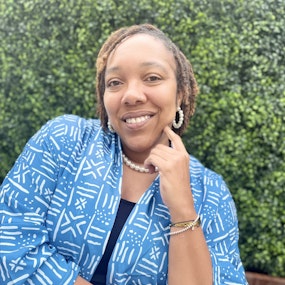
Brittni
Change agent | Owner
Brittni Joy is a woman who lives a life of purposeful integrity. As a Denver Native, she grew up in a neighborhood that promoted the nurturing of community, a belief in collaboration, and placed a large input in expression and creativity. She has used these skills to develop a platform that builds upon the use of connectivity in business and beyond.
Having lived abroad for almost a decade, Brittni brings a very diverse cultural mentality to her workshops and speaking engagements. She understands that culture, experience, knowledge and empathy are the pathways to create a more cohesive community. Brittni has experienced over 45+ countries to date, and knows that the largest connector globally is empathetic engagement.
Brittni has a B.A. from Spelman College, located in Atlanta, GA, USA in Child Development and a M.A. in Business Administration from the University of Roehampton, London,UK. She also has a hospitality management certification from Florida Atlantic University in Boca Rotan, FL, USA. Her educational achievements have lead her to understand and explain a wide variety of topics and be able to provide insight and consultation on said topics. Her strength is Justice, Equity, Diversity, & Inclusion. (JEDI) Brittni understands that with a focus on JEDI, the empathy is second nature in any organization.
Empathetic Engagement is a platform that is a component of every workshop and event. Having the courage to “see” others in conversation, community, and alliance provides growth in self and others. Providing these engaging opportunities… Read More
New to The Exit Interview: A Podcast for Black Educators?
Here are some great episodes to start with.




















